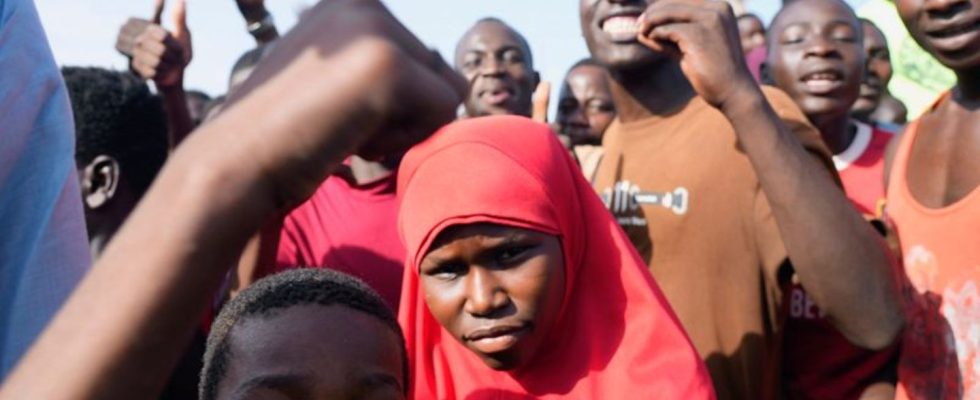After coup
Rulers in Niger plan transitional government
Young Nigerians gather in the capital, Niamey. photo
© Sam Mednick/AP/dpa
In Niger, a peaceful solution seems within reach. The new rulers do not want to resign, but rather form an interim government. Diplomatic talks are in full swing.
The leader of the military junta said the decisions would be made “without outside interference”. Tiani did not comment on whether democratic elections would be held after the transition period.
Meeting with Ecowas delegation
A few hours earlier, Tiani had met for the first time on Saturday with a delegation from the West African community of states Ecowas in the Nigerian capital Niamey. Previously, Tiani had always refused such requests for talks. The Ecowas delegation also visited President Mohamed Bazoum, who was elected by the putschists, for the first time on Saturday.
“Tiani’s announcement shows that the putschists now want to remain permanent,” said Ulf Laessing, the Sahel regional director from the Konrad Adenauer Foundation, the German Press Agency. It is likely that the new constitution to be enacted will grant amnesty and greater powers to Niger’s new president. The military junta in Mali had already acted according to this pattern after a coup d’etat.
The announcement of a three-year transition period was a slap in the face for Ecowas, said Laessing. Ecowas does not have much room for maneuver. The confederation will likely attempt to negotiate a shorter transition period and Bazoum’s release. Laessing considers military intervention to be unlikely: “Everyone knows that the threat of a military strike was not meant seriously because Ecowas does not have the capacity.”
After the July 26 coup in Niger, Ecowas originally called for the constitution and the ousted president, who is under house arrest, to be reinstated. In an interview with the New York Times, a civilian member of the junta promised that Bazoum would not be harmed. The new rulers had previously accused Bazoum of high treason. This is punishable by death in Niger.
Diplomacy at full speed
Diplomatic talks were in full swing in Niger over the weekend. A UN delegation met with Nigerien Prime Minister Lamine Zeine in Niamey. There is “no crisis without a solution, and a solution can always be found in dialogue,” said the UN special representative for West Africa, Leonardo Santos Simão, afterwards on state television.
The new US Ambassador, Kathleen FitzGibbon, also arrived in Niamey on Saturday to step up efforts to resolve the political crisis. Niger, a Sahel country with around 26 million inhabitants and one of the poorest populations in the world, was one of the last democratic partners of the USA and European states on the southern edge of the Sahara before the coup.
“As a senior diplomat with extensive experience in West Africa, she is uniquely placed to lead the US government’s efforts to support the American community and protect Niger’s hard-earned democracy,” the US State Department said.
The British Embassy in Niamey has meanwhile withdrawn some of its staff from the country. Pope Francis said on Sunday that he hoped the crisis would be resolved peacefully. He follows the events in Niger with concern. “I join the bishops’ appeal for peace in the country and stability in the Sahel region,” said the Catholic Church leader after the Angelus prayer in front of believers and onlookers on St. Peter’s Square.
By the weekend, after numerous threats from Ecowas, a violent solution had been within the realms of possibility. On Friday, Ecowas announced that the confederation of states was ready for a military intervention. A target date for an assignment has been set, but is not publicly announced. In response, the putschists said they had developed a defense strategy with “concrete measures” together with their neighbors Mali and Burkina Faso. Mali and Burkina Faso, like Niger, have been ruled by the military since coups in their countries.

